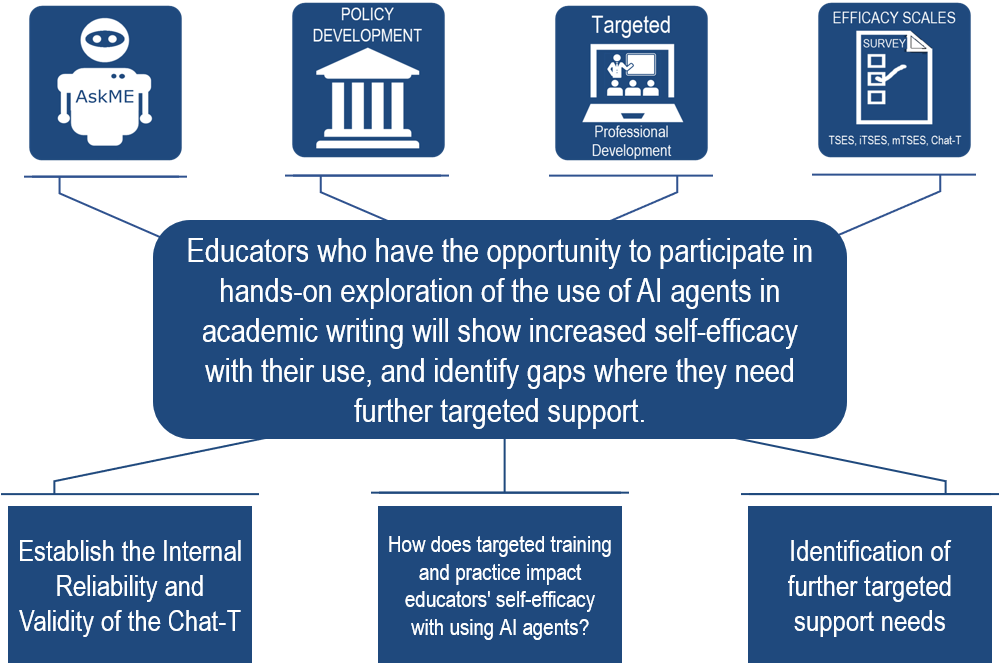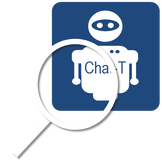Research Problem
A recent survey has shown that over half of post-secondary students have used AI agents to complete assignments or tests (DeLaire, 2023). D’Andrea (2023) quotes University of Saskatchewan educational ethics research Sarah Eaton who notes that while “[t]here are strong indications from Microsoft and Google that by the end of 2025, AI technologies will be fully integrated into Microsoft Office and the Google Suite of products.” But, educators are unprepared for the deep integration of such tools into student activity. Preparing educators to effectively leverage AI agents, and to discourage their misuse, requires targeted supports. This research aims to investigate the use of an adapted version of the TSES, called the ChatGPT Teacher’s Sense of Efficacy Scale (Chat-T), to identify gaps in educators’ perceptions of efficacy with the use of AI agents such as ChatGPT in their teaching and learning practice.
Conceptual Framework
Research Questions
- What is the internal reliability and validity of the Chat-T research instrument?
- How does targeted training and practice impact educators’ perceptions of self-efficacy with the use of AI agents in teaching and learning practice?
- What additional targeted supports do educators need to increase their confidence with the use of AI agents in teaching and learning practice?
Significance of the Research
This research aims to investigate the impacts of targeted training and a targeted hands-on experience with the use of AI agents, such as Chat GPT, on perceptions of self-efficacy with the use of AI agents in teaching and learning practice amongst graduate Education students. This research also aims to establish the internal reliability and validity of the Chat-T research instrument, adapted from the TSES instrument, and its utility as a tool for gauging the effectiveness of professional development activities and the identification of gaps in confidence requiring further targeted supports. It is anticipated that the results of this research will provide information and a new tool that will be useful to administrators, policymakers, and others involved with planning for and supporting the integration, and effective and ethical use of AI agents in teaching and learning practice.
Detailed Research Proposal
The Chat-T Survey Instrument
Using the Chat-T as a Research Tool
|
An online version of the Chat-T survey instrument is available using Google Forms. The form should be copied into your own Google Drive account. Simply copy the form, and update the settings so that it reports submissions to a new Google Sheets document. You'll then be able to download the data in common spreadsheet application formats for offline quantitative analysis.An online version of the mTSES survey instrument is available using Google Forms. The form should be copied into your own Google Drive account. Simply copy the form, and update the settings so that it reports submissions to a new Google Sheets document. You'll then be able to download the data in common spreadsheet application formats for offline quantitative analysis.
|
Chat-T Resources
Publications
Power, R. (2024). Evaluating Graduate Education Students’ Self-Efficacy with the Use of Artificial Intelligence Agents. Journal of Educational Informatics, 5(1), 3-19. https://journalofeducationalinformatics.ca/index.php/JEI/article/view/269
Conference Presentations
|
Power, R. (2024). Educator Confidence with AI: A Case Study and a New Research Tool. [Presentation File]. Invited presentation at Artificial Intelligence: The Balance of Innovation and Prevention, 21 March 2024, Cape Breton University, Sydney, NS, Canada.
|
|
Additional Resources
Stay tuned for more resources related to the Chat-T research project, including publications and presentations.




